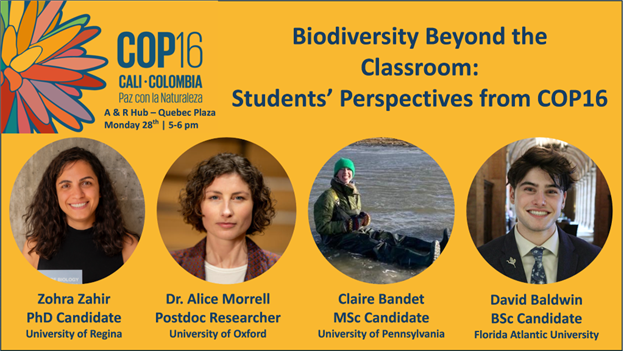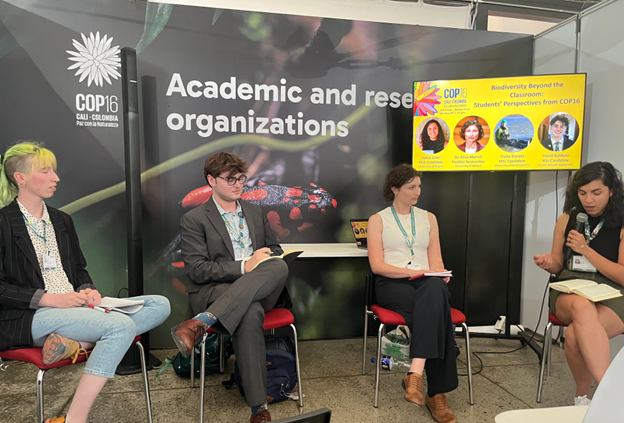COP16 Dispatch: Week 2 Students’ Reflections on COP16 and Biodiversity Policy
By Zohra Zahir, Ph.D. Candidate, University of Regina, Canada
I had the incredible opportunity to moderate the panel “Biodiversity Beyond the Classroom: Students’ Perspectives from COP16” at the Academic and Research Hub at COP16 in Colombia, where I joined fellow students Dr. Alice Morrell from the University of Oxford, David Baldwin from Florida Atlantic University, and Claire Bandet from the University of Pennsylvania, to discuss our experiences, reflections, and challenges encountered at the conference.
As emerging scientists, our goal was to unpack how policymakers talk about science, especially in the context of biodiversity—the main focus of COP16. One major insight we all shared was the need for policymakers to draw more from academic research. “Policymakers need to tap into academia more,” Alice observed. “Our voice needs to be part of the conversation.” This shared sentiment brought up a critical question: How can we make the research produced in academia not only accessible but also actionable? The effect of “the evidence-based policy claiming to be written at COP16 needs to be more intimate with the research produced by academics and scientists,” David answered.

Poster from the discussion panel at COP16 in Cali, Colombia, held on October 28th, 2024.
Claire added an important perspective, recounting a conversation with a policymaker who urged scientists to “come down from their ivory towers.” She noted, “If we don’t make science communication better, we’re not reaching the people who need to hear it the most.” Her comment struck a chord; if we want our science to truly drive change, it needs to be communicated in ways that resonate beyond academia.
David took it further, emphasizing self-advocacy: “We need to be our own biggest advocates. If we don’t push for our work to be included, science risks staying on the sidelines.” The transition from classroom learning to the international COP16 stage was eye-opening for each of us. We shared stories of countless emails, networking efforts, and perseverance that helped us get here.
Stepping out of the structured academic environment showed us how science can translate to real-world applications in global biodiversity policy. One audience member, Ana Valeria from Ecological Society of America, asked a question that gave us all pause: “What do you think is the role of students at COP16?” We all agreed that there’s a need for a much stronger student presence. When Aminata Sidibe from Global Youth Biodiversity Network asked us how youth can become more engaged, we all acknowledged that young scientists are important voices in these conversations, but more work is needed to amplify our perspectives and integrate student-led research into these spaces. David added that hearing so many people say they are counting on “the next generation” reignited his passion for scientific research.
The panel concluded with an open reflection on what’s next. When asked by Carlos Alberto Silva from the Organization for Tropical Studies, another audience member, I shared my plans to speak at my university about my experience at COP16 and Canada’s role in biodiversity policy. I also plan to emphasize the importance of integrating Indigenous and local community perspectives, whose voices are essential in conservation efforts.
Claire looks forward to sharing her experiences with her students to show them the global impact their studies can have. David and Alice plan to reconnect with the people they networked with at COP16, building on the relationships they established at the conference. “We’re bringing back a global network we didn’t have before,” David said, adding that this experience has expanded his perspective on science as a collaborative, international effort. Reflecting on COP16, we were all moved by the diversity of people and perspectives—languages, countries, and voices united for the cause of biodiversity. As Alice put it, “It was amazing to see so many people here for the same cause.” For us, this wasn’t just a conference; it was an invitation to turn our studies into action, to make the case for the critical role of science in policy, and to advocate for a stronger presence of young scientists on the global stage.

Panel discussion at COP16 in Cali, Colombia, on October 28, 2024. From left to right: Claire Bandet, David Baldwin, Alice Morrell, and Zohra Zahir. Photo credit: Ana Valeria Medina.
Disclaimer: Opinions are solely those of the guest contributor and not an official ESA policy or position.